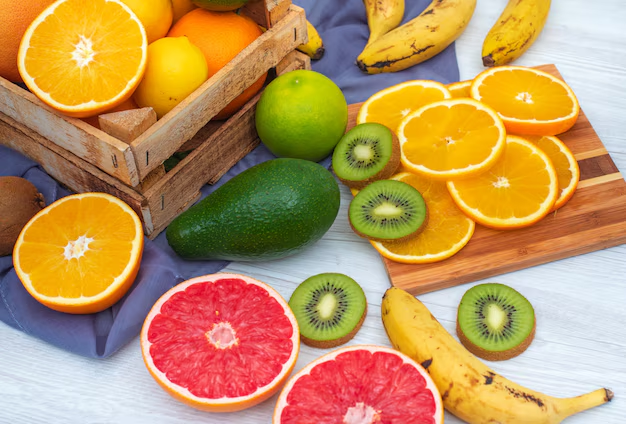Discover Which Fruits Last Longest in Your Refrigerator 🥶🍎
Is your fridge home to forgotten fruits turning into sad, unidentifiable mush in the corner of a drawer? You're not alone. With proper knowledge and care, some fruits can remain fresh and crispy long after others have turned limp. Understanding which fruits can withstand the cold for the longest time can help you maximize flavor and minimize waste. Let’s delve into the colorful world of fruit preservation and uncover the top contenders for long-lasting refrigerator resilience.
The Champions of Refrigerated Longevity: Top Fruits to Extend Your Freshness
Though many fruits thrive in cool, dry environments, some are particularly adept at standing the test of time in a refrigerator. Here's a breakdown of fruits that are typically known for their longevity when stored under proper refrigerated conditions:
🍎 Apples: The Icon of Freshness and Versatility
Durability: Apples often last several weeks to months when stored in a cool, dry refrigerator drawer. Their structure and natural waxy coating help conserve moisture and keep the fruit firm longer than many others.
Storage Tip: Keep apples away from other produce. Apples emit ethylene gas, which can speed up the ripening and spoilage of nearby fruits. Storing them in their own compartment can help extend the life of other produce.
🍊 Citrus Fruits: Oranges, Lemons, and Limes
Durability: Citrus fruits like oranges, lemons, and limes can last for weeks under refrigeration. Their thick peels protect them against rapid moisture loss and decay.
Storage Tip: Store them in the refrigerator drawer or in a mesh bag. The air circulation prevents mold growth and keeps them fresh.
🍐 Pears: Steadfast and Supple
Durability: Particularly when slightly underripe when placed in the fridge, pears can last quite a while. As with apples, their firmer varieties tend to fare better in cold storage.
Storage Tip: Ripen them at room temperature before storing them in the refrigerator. This method prevents them from ripening excessively in the fridge, which can cause them to spoil faster.
🍇 Grapes: Frozen Jewels
Durability: Grapes can last a few weeks if stored correctly. With good air circulation and proper moisture levels, they remain fresh and crisp.
Storage Tip: Keep grapes in a breathable bag or container. Wash them only before eating to avoid accelerating spoilage.
🍒 Cranberries: Tart and Tenacious
Durability: Cranberries are a powerhouse of durability, lasting several weeks to months in the fridge. Their high acid content and tough skin shield them from decay.
Storage Tip: Store them in their original packaging or a vented bag to extend their lifespan.
Factors Affecting Fruit Shelf Life in the Refrigerator
Storing your fruit in the refrigerator can optimize freshness, but a few important factors can impact how long that freshness lasts:
Temperature Settings
Optimal Range: The ideal refrigerator temperature is between 32°F and 40°F. Some fruit can succumb to freeze burn below this range or spoil above it.
Moisture Control
Refrigerators are inherently dry environments. Therefore, maintaining appropriate moisture levels is critical. Fruits like berries need a humid setting to prevent moisture loss, while others, such as apples and pears, prefer dry environments.
Air Circulation
Air movement can prevent the growth of mold but can also cause dehydration in some fruit. Proper airflow balance, using drawers or ventilated containers, plays a significant role in extending freshness.
How to Prep Fruits for Maximum Refrigerated Shelf Life
Ready to make your fruits last longer? Follow these simple preparation and storage tips to keep your produce at its best long past the weekly grocery trip.
Prepping and Storage Techniques
Wash Only Before Use: Moisture is a breeding ground for mold, so washing only before consumption helps reduce this risk.
Use Breathable Bags: For fruits requiring air circulation, ventilated bags can keep the airflow steady, preventing mold and stopping moisture loss.
Separate Sensitive Produce: Some fruits, such as bananas, release gases that ripen other fruits. Keeping them apart from sensitive produce helps maintain individual freshness.
Handy Storage Hacks 🍏
Crisper Drawers with Adjustable Humidity: Utilize the humid option for fruits needing moisture and the dry setting for those that thrive in less humid environments.
Place at the Right Level: Keep heavier, squishable fruits on top in crisper drawers to prevent bruising from the weight of others.
Rotate Stock: Adopting a first-in, first-out approach ensures you use older fruits before they become overripe.
Longevity at a Glance: The Fruit Freshness Table 🌟
| Fruit Type | Estimated Fridge Lifespan | Storage Tip |
|---|---|---|
| Apples 🍎 | 1-2 months | Keep in separate compartment |
| Oranges 🍊 | 3-4 weeks | Store in crisper drawers |
| Pears 🍐 | 1-2 weeks (varies with ripeness) | Let ripen at room temp before storing |
| Grapes 🍇 | 1-3 weeks | Use ventilated container or mesh bag |
| Cranberries 🍒 | 1-2 months | Keep in original packaging or vented bag |
Simplifying Your Storage Strategy: Takeaways for Better Fruit Longevity
Storing fruit for extended freshness doesn’t need to be complicated. With some basic knowledge and a bit of attention, you can prevent waste and enjoy every bite. Here are essential tips to integrate into your routine:
- 🌟 Refrigerate Wisely: Learn the specific storage needs of each fruit to maximize their fridge lifespan.
- 🌀 Control Your Climate: Leverage fridge settings to maintain ideal temperature and humidity.
- 🍏 Prevent Ethylene Gas Buildup: Store fruits strategically to maintain their natural state for longer.
- 📅 Track and Rotate: Regularly check your stored fruits and use those closest to expiration.
By understanding how to best store and prepare your fruits, you'll extend their life, maintain flavor, and reduce waste, making each bite just as enjoyable as the first. As you navigate your fridge, these tips will keep your produce fresh, vibrant, and ready for your next meal. Happy munching! 🍽️🥭

